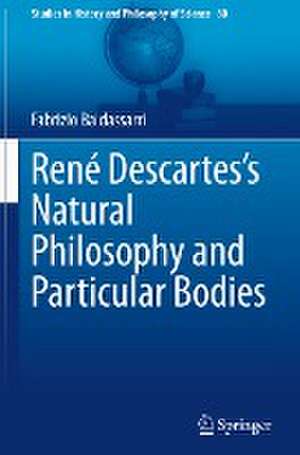René Descartes’s Natural Philosophy and Particular Bodies: Studies in History and Philosophy of Science, cartea 60
Autor Fabrizio Baldassarrien Limba Engleză Hardback – 2 ian 2024
Din seria Studies in History and Philosophy of Science
- 15%
 Preț: 650.19 lei
Preț: 650.19 lei - 15%
 Preț: 700.75 lei
Preț: 700.75 lei -
 Preț: 284.47 lei
Preț: 284.47 lei -
 Preț: 389.88 lei
Preț: 389.88 lei - 18%
 Preț: 1222.94 lei
Preț: 1222.94 lei - 15%
 Preț: 647.08 lei
Preț: 647.08 lei - 15%
 Preț: 645.47 lei
Preț: 645.47 lei - 18%
 Preț: 956.33 lei
Preț: 956.33 lei - 18%
 Preț: 953.97 lei
Preț: 953.97 lei - 15%
 Preț: 646.11 lei
Preț: 646.11 lei - 15%
 Preț: 641.85 lei
Preț: 641.85 lei - 15%
 Preț: 644.49 lei
Preț: 644.49 lei - 18%
 Preț: 951.29 lei
Preț: 951.29 lei - 15%
 Preț: 647.40 lei
Preț: 647.40 lei - 18%
 Preț: 953.20 lei
Preț: 953.20 lei - 18%
 Preț: 946.87 lei
Preț: 946.87 lei - 18%
 Preț: 1384.56 lei
Preț: 1384.56 lei - 18%
 Preț: 1234.14 lei
Preț: 1234.14 lei - 15%
 Preț: 637.78 lei
Preț: 637.78 lei - 15%
 Preț: 633.53 lei
Preț: 633.53 lei - 18%
 Preț: 1219.77 lei
Preț: 1219.77 lei - 24%
 Preț: 586.95 lei
Preț: 586.95 lei - 18%
 Preț: 967.56 lei
Preț: 967.56 lei - 15%
 Preț: 641.38 lei
Preț: 641.38 lei - 15%
 Preț: 642.68 lei
Preț: 642.68 lei - 15%
 Preț: 642.03 lei
Preț: 642.03 lei - 15%
 Preț: 641.85 lei
Preț: 641.85 lei
Preț: 702.24 lei
Preț vechi: 826.16 lei
-15% Nou
Puncte Express: 1053
Preț estimativ în valută:
134.37€ • 140.31$ • 110.96£
134.37€ • 140.31$ • 110.96£
Carte disponibilă
Livrare economică 25 martie-08 aprilie
Preluare comenzi: 021 569.72.76
Specificații
ISBN-13: 9783031486623
ISBN-10: 3031486625
Pagini: 208
Ilustrații: XV, 208 p. 1 illus.
Dimensiuni: 155 x 235 mm
Greutate: 0.57 kg
Ediția:1st ed. 2023
Editura: Springer International Publishing
Colecția Springer
Seria Studies in History and Philosophy of Science
Locul publicării:Cham, Switzerland
ISBN-10: 3031486625
Pagini: 208
Ilustrații: XV, 208 p. 1 illus.
Dimensiuni: 155 x 235 mm
Greutate: 0.57 kg
Ediția:1st ed. 2023
Editura: Springer International Publishing
Colecția Springer
Seria Studies in History and Philosophy of Science
Locul publicării:Cham, Switzerland
Cuprins
Glossary.- Introduction.- Part 1. A Theoretical Framework.- 1. Method.- 2. Nature.- Part 2. Practical Knowledge.- 3. Metals.- 4. Plants.- 5. Animals.- Conclusions.
Notă biografică
Dr. Fabrizio Baldassarri is an expert of Descartes's philosophy and science. He has been the recipient of a Marie-Curie Fellowship at Ca’ Foscari University Venice and Indiana University Bloomington. He has edited volumes, such as Vegetative Powers (Springer 2021), Descartes and Medicine (Brepols 2023), Andrea Cesalpino and Renaissance Aristotelianism (Bloomsbury 2023), Plants in 16th and 17th century (De Gruyter 2023) and several special issues for Early Sciene and Medicine, the Journal for Early Modern Studies, Nuncius. He is the author of a monograph entitled, Il metodo al tavolo anatomico: Descartes e la medicina (Rome 2021).
Textul de pe ultima copertă
This book explores René Descartes’s attempts to describe particular bodies, such as rocks, minerals, metals, plants, and animals, within the mechanistic interpretation of nature of his philosophical program. Despite his early rationalistic epistemology, Descartes’s increasing attention to collections, histories, lists of qualities, and particular bodies results in a puzzling ‘short history of all natural phenomena’ contained in the Principles of philosophy (1644). The present book outlines the role of Descartes's observations and experimentation as he aimed to construct a universal science of nature, ultimately revealing the mechanization of nature in detail, and for curious bodies such as the Bologna Stone or the sensitive herb. What results is a theoretical natural history consistent with the mechanical principles of his philosophy, ultimately shedding new light on his attempt to produce a complete philosophy of nature.
Caracteristici
Engages with the changes of Descartes’s epistemology Sheds new light on Descartes’s invention of nature, and observations and experiments with natural bodies Analyses Descartes’s short history of all natural phenomena—minerals, plants, and animals
